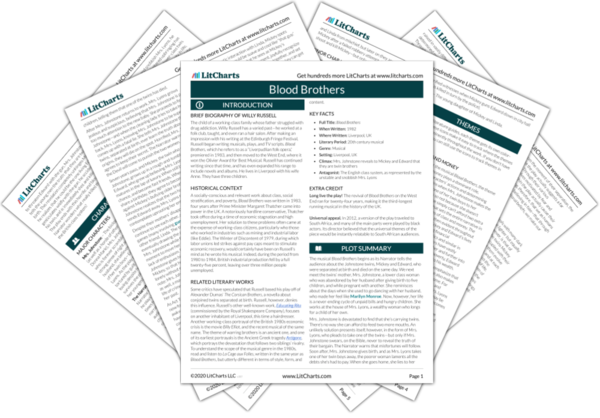Class and Money
Throughout the musical Blood Brothers, the theme of class and money plays a dominant role, controlling characters’ actions and determining their lives. This pattern begins when Mrs. Johnstone makes the fateful decision to give away one of her twin boys to her employer Mrs. Lyons. She does so not because she doesn’t want two babies, but because she simply can’t afford two extra mouths to feed. Thus the action that sets the entire…
read analysis of Class and MoneyNature vs. Nurture
On some level, the lives of Mickey and Edward seem almost like a science experiment: what will happen when two genetically similar boys are raised in vastly different circumstances? Is a person’s character determined more by their genetics, or by their upbringing? Throughout the play, Willy Russell illuminates the contrasts that stem from Mickey and Edward’s separate childhoods, and compares them with the similarities that the two share. Mickey, for instance, is rough, rebellious, and…
read analysis of Nature vs. NurtureSuperstition and Fate
The theme of superstition and fate is one that the playwright—in the voice of the Narrator—brings up over and over again throughout the musical. Near the beginning of the play, the devious Mrs. Lyons tells Mrs. Johnstone that if two long-lost twins ever learn that they are related, they will both die instantly—and at the end of the play, despite the improbability of Mrs. Lyon’s made-up superstition, this is exactly what comes to pass…
read analysis of Superstition and Fate
Coming of Age
The musical Blood Brothers deals with many dark and complex issues. One of the lighter but equally important themes within it, however, is that of coming of age. Although the play ends with the twins Mickey and Edward’s deaths, most of the musical is occupied with their lives and the events of their growing up. We see them evolve from infants, to boys, to teenagers, to young men, and at each point playwright Willy…
read analysis of Coming of AgeThe Power of the Past
Throughout Blood Brothers, many characters dream of a new beginning, even as they are still mired in the past. Both Mrs. Johnstone and Mrs. Lyons exemplify this impulse. Mrs. Johnstone begins the play reminiscing about her deadbeat husband and mourning his loss, while also trying to figure out how to feed her family. Mrs. Lyons, meanwhile, decides early on in the play to pretend that her adopted son, Edward, is actually her biological…
read analysis of The Power of the PastViolence
Violence, in forms both innocent and deadly, shows up over and over again in Blood Brothers. Even as children, the characters play violent games, “killing” each other with pretend guns in the song “Kids’ Game.” As they grow older, the violence becomes more real and threatening, reaching its first peak when Mickey’s older brother Sammy commits murder during an armed robbery. Of course, the violence doesn’t climax until the final scene of the…
read analysis of Violence











